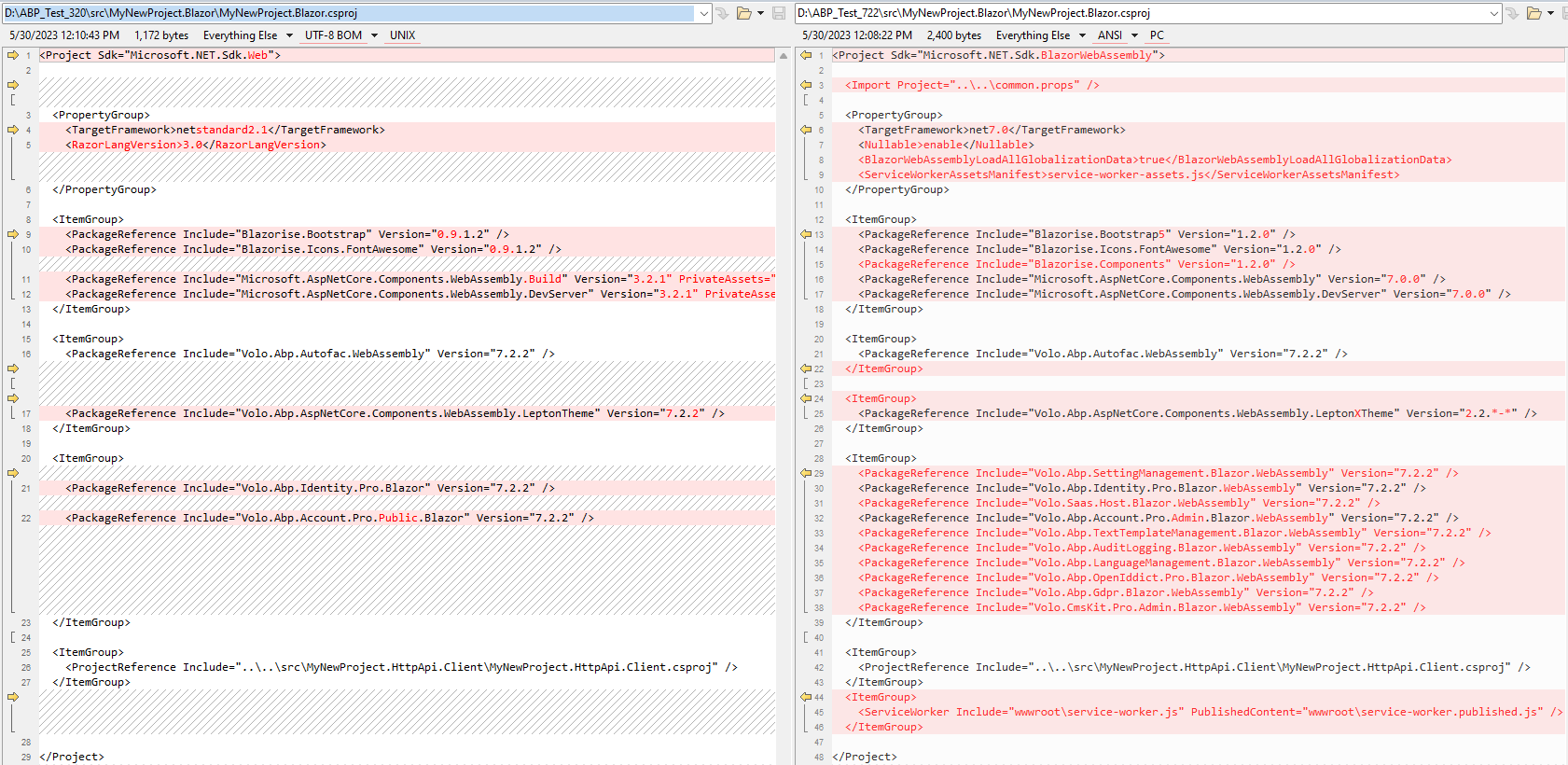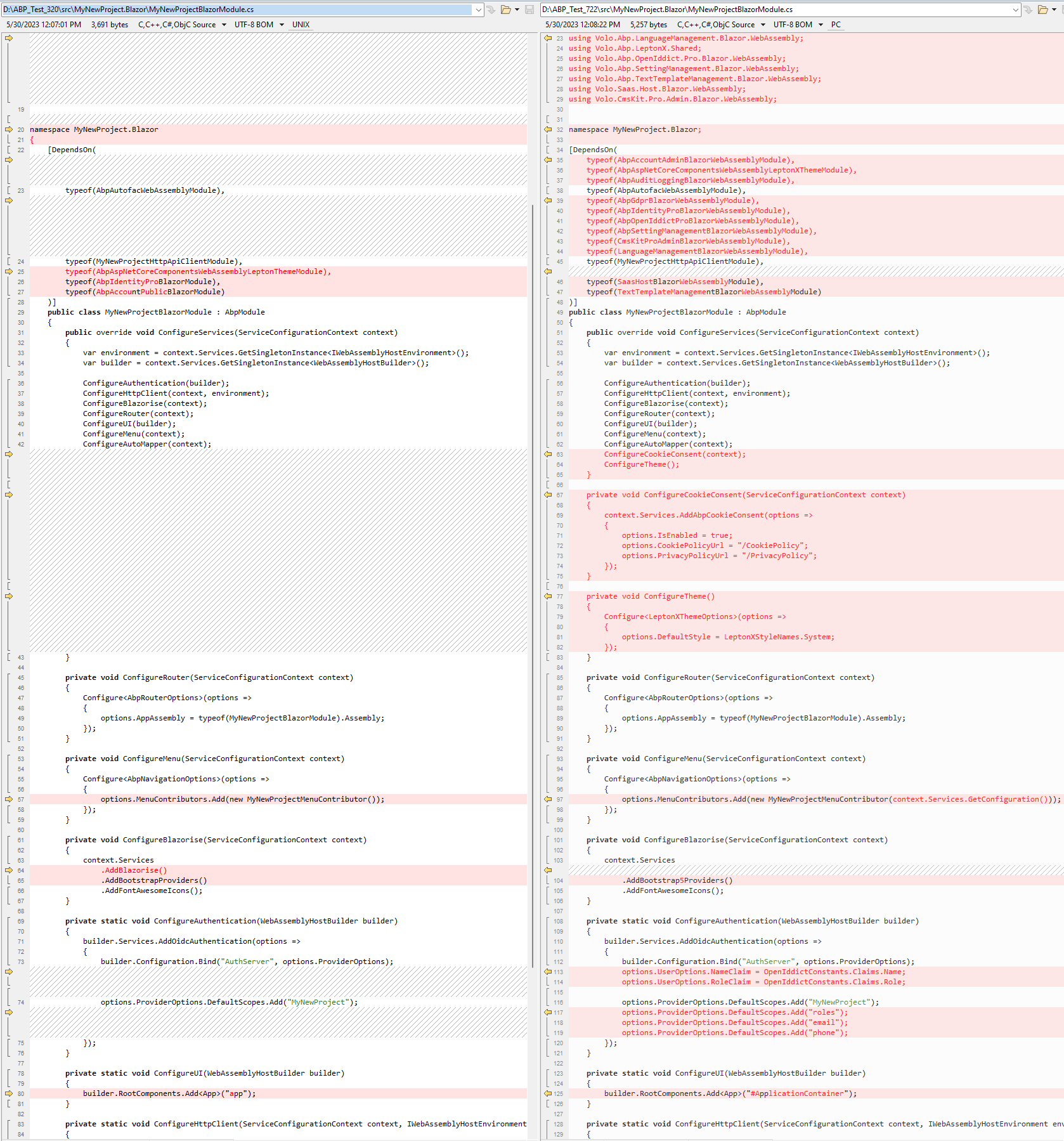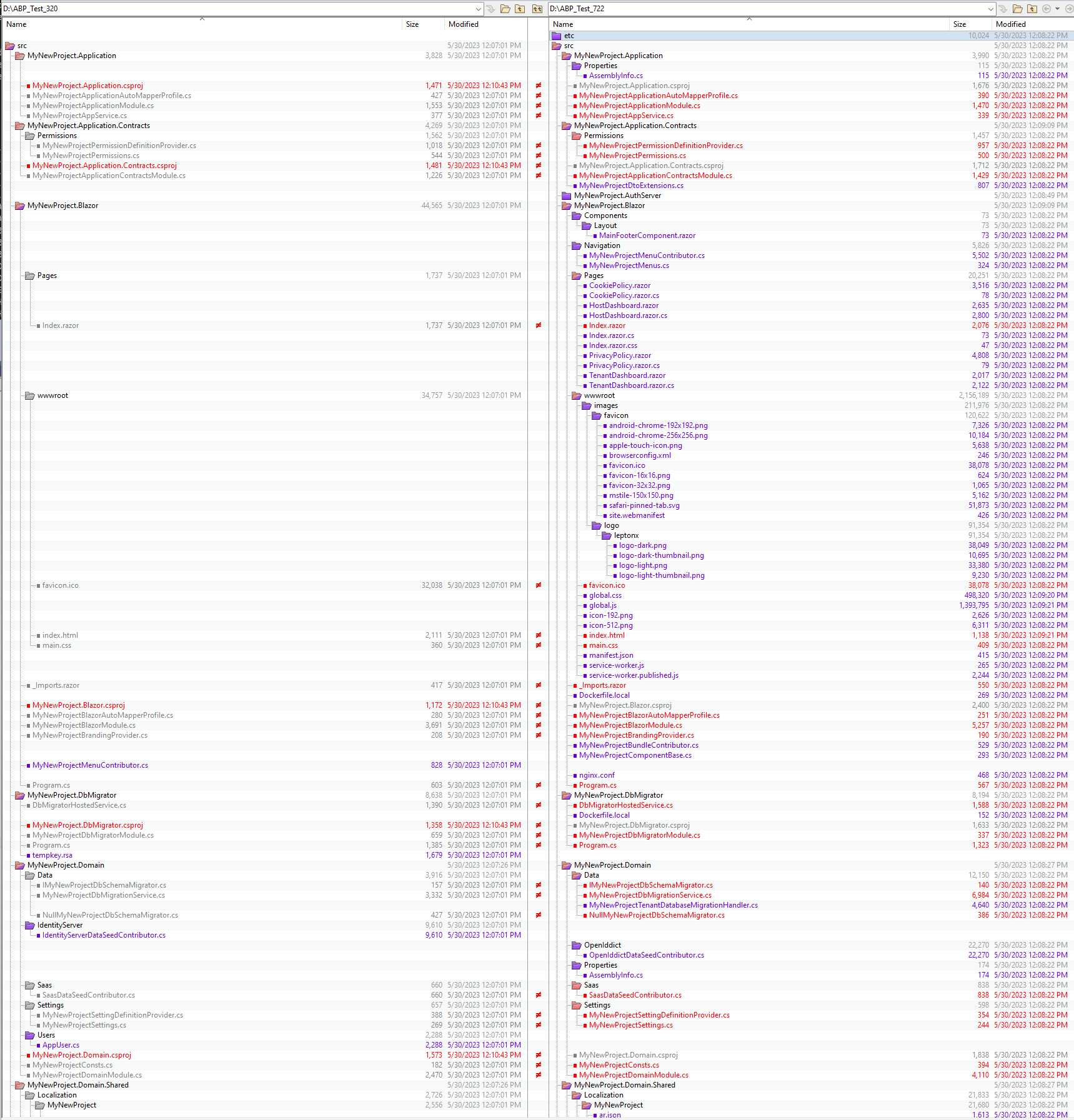Activities of "cfd000"
Jack, It is acceptable to simply replace the open source framework, but that doesn't begin to cover all of the complications related to updating the modules and the solution created by ABP. I made a trivial example by building a solution twice, once referencing the 3.2.0 version of ABP and another referencing 7.2.2. Once I had both created, I ran ABP UPDATE against the 3.2.0 version and compared the results. The ABP UPDATE command doesn't even come CLOSE to creating a project that is on-par with one built from 7.2.2 from scratch. I understand why this is, but the reason we pay for ABP year after year is to take advantage of all of the features and improvements that are constantly being made (which are great!). If we have to manually edit everything to update our solution then this could take days (and that's assuming that the documentation has each of these changes detailed, which it frequently does not!).
Look at the differences in the Blazor project and Module class alone:
If we are paying for a subscription that includes source code, why would we still use the NuGet packages? The reason we are using the source is to allow us to push emergency fixes to production when ABP has not yet had time to respond.
Here is an example - a security patch gets pushed that breaks some existing functionality (could be a .NET fix for an exploit that we are required to deploy, could be a browser patch that customers are applying themselves, etc). Our application is used for time-sensitive work and we cannot wait for ABP to implement a fix, test it, and release a new version of the framework. By building our solution from full source, we can implement our own fix or workaround immediately. We also have a fully automated and containerized CI/CD pipeline, so it isn't possible to just compile and replace a single DLL.
Suite needs to find
Volo.Abp.Commercial.SuiteTemplates.dllin your project output directories. As I understand you exclude this DLL. Suite will not work if it cannot find this file because all the templates to generate the code are in this file.
Please read the posted question before responding - this response makes no sense in response to the problem reported. We are not using SUITE, we are using CLI. We are not excluding anything - we are creating a new solution, and it contains references to the projects under the 'licensing' folder, which are not part of the source that is released - hence the solution fails to compile. Once I MANUALLY go through all project files and replace project references with packages references I can make it compile, but it is broken "out of the box".
Jack, thank you for your detailed response.
Did I get that right? If yes, please consider either
- Writing modules for your own code and install them to stay maintainable. You can then use
abp upgradeagain- Shift the process. Keep one repository - lets say "MyAbpTextTemplatingModule". When a new version is available, create a branch for example "abp-722" and merge that into your custom repository. That way you will have way less headaches and you will be way faster in adapting new versions.
kind regards Jack
What is the suggested way of making changes or additions to the projects that are created by ABP so that conflicts are minimized? For example, changes to the 'Module' classes.
Thank you, that does solve the problem.
I think this is a bug though, the publicly available source code should not be 'broken' out of the box.
Here's an example - I've spent quite a bit of time looking for this information: https://support.abp.io/QA/Questions/4042/Lepton-x-Theme-Source-Files-SCSS
I can't find the information anywhere, and the question that should have the answer was closed, with no resolution.
I see that most of the comments are abstract.
To fine-tune our documentation and get started steps, we need concrete examples.
Because for me it's very straightforward to kick-start a project.
Imagine that you start a new scratch ASP.NET Core project with Docker, DevExpress, and Identity Server with a tiered architecture, would it be slaphappy?
You asked for input on ways the support could be improved, and your responses say that you don't want to hear it.
Try to create a new solution with version 7.0.2 or 7.1.0 preview - app-pro, tiered, maui-blazor, PWA, separate identity server, and PostgreSQL. It doesn't run. You can't see the error because the screen is white and the text is white. It isn't immediately obvious if the program is hanging, or crashing, or not even starting. Once you change the text color the error just says an exception occurred in the Initialize function of one of the base ABP classes, which is not something you can debug unless you have full source code. The only way to find a more specific exception was to step through every single line of code. This is not "slaphappy".
You are selling a product that is supposed to allow the users to NOT have to become experts on all of the awesome features you have coded, but your documentation and tips for getting started are written from the perspective of people who ARE experts in all of those areas, and are expecting the audience to have a similar level of knowledge as well. I think you will have a much better chance of success with new perspective customers if you take the time to understand what things can go wrong for first time users, and provide some guidance on what a user needs to understand if they are going to deviate from the "out of the box" experience. We are very happy we are using ABP, but we had a LOT of frustration getting our solution off the ground, and we still get frustrating responses many times from support. Multiple DETAILED tickets where the response is effectively "RTFM". One was "You can't use DevExpress with a tiered solution". REALLY? We aren't expecting ABP to hand us fully functional solutions when we are doing custom integrations, but we do expect help understanding how to respect the benefits of ABP and still do what our business requires.
The framework is great, but the support frequently leaves us frustrated.
That does not answer the question at all. It is VERY frustrating that each time we open a ticket, the first response is to link to some generic documentation page. Did you actually read the question?
You keep avoiding answering my direct question.
We cannot implement any .NET classes because the legacy application is not written by us, it is a 3rd party C++ application which is writing directly to the database.
We have no problems using Auditing within ABP. We are looking to populate the audit log tables for changes made OUTSIDE of ABP in our legacy application (which does direct SQL queries, and cannot be modified to use the ABP APIs). Is there a documented approach? If not, is there a specific class we can look at to determine how best to emulate the logic? We have a subscription that includes full source code.


